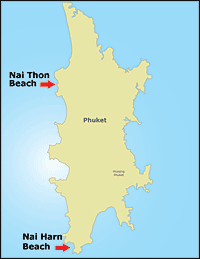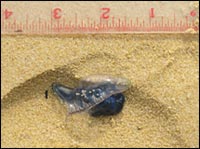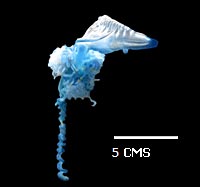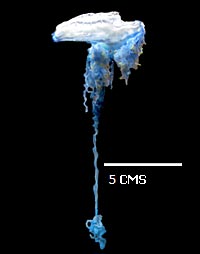Lifeguards patrolling Phuket’s Nai Harn Beach reported to the Phuket Marine Biological Center (PMBC) on 19 June 2011 that they had found marine creatures resembling jellyfish washed up on the shore since 18 June and had collected six live specimens for identification. Following a survey of the area, PMBC officials collected a total of nine specimens. PMBC officials also investigated a second report of jellyfish being spotted, and two specimens were collected on Nai Thon Beach, also in Phuket.
The PMBC has identified the specimens collected as being venomous marine stingers known by the scientific name Physalia. More widely known by its common names – the Bluebottle, Portuguese Man-of-War, Man-of-War, or Pacific Man-o’-War, Physalia are marine invertebrates of the family Physaliidae. The species Physalia utriculus is given the common name Pacific Man-o’-War to distinguish it from the more widely distributed and larger Physalia physalis, the Portuguese Man-o’-War.

This is the first ever sighting of the Bluebottle (Physalia) along Thailand’s Andaman coast.
Important:
Although the Bluebottle resembles a jellyfish, and is often mistaken for one by its victims, it is not a true jellyfish but a siphonophore consisting of a colony of minute organisms called zooids, as opposed to a single creature.
Incorrect identification may lead to the improper treatment of stings. The venom differs from that of true jellyfish and therefore must be treated differently.
Note: The use of vinegar is only effective in treating stings from other kinds of less venomous jellyfish, but is not recommended in cases involving Bluebottle or Portuguese Man-of-War stings. Vinegar is believed to activate the stinging cells of the Bluebottle and in some cases makes the sting worse.
PREVENTION
According to the Tropical Australian Stinger Research Unit (TASRU), “The first line of defence against potentially deadly jellyfish stings is awareness and prevention.”
Although not all jellyfish are dangerous to humans, stings from the most venomous varieties can cause death within four minutes if the venom reaches the heart and causes cardiac arrest. According to jellyfish experts, the best line of protection is to remain aware, vigilant and avoid taking any risks.

The best way to be prepared is to remember the following:
Avoid all jellyfish, not because they are all dangerous, but because few of us have the training of marine biologists to be able to distinguish one iridescent floating ‘blob’ from another.
A dead jellyfish washed up on the beach may look harmless, but if the tissue is still moist it can sting.
Wear protective swimwear, like a rash guard that covers head, neck as well as hands, and a pair of flippers (fins) or swimming shoes, to avoid all contact with jellyfish and marine stingers.
Entering the water slowly is good practice because it gives marine stingers time to float or move out of the way.
Swim with a partner and keep your eyes peeled when venturing out. The sting from a jellyfish can be paralysing, which can make it difficult to swim back to shore.
ADVICE FROM THE PMBC
Visitors are advised to avoid swimming in the sea where jellyfish have been spotted or are known to be present.
IMMEDIATE FIRST AID ADVICE
Immediate first aid steps to take if an individual is suspected to have a Bluebottle or Portuguese Man-of-War sting
 Bluebottle or Portuguese Man-of-War found at Nai Harn Beach
Bluebottle or Portuguese Man-of-War found at Nai Harn Beach
Get the victim out of the water as soon as possible. Monitor their pulse rate.
Following a Bluebottle/Portuguese Man of War sting, it is important to carefully remove any remaining tentacles or remnants of the creature from the skin before taking the victim to a hospital.
To prevent further stings, this should be done carefully and gently using a plastic card or a stick to lift any remaining tentacles. Gently rinse the area well with sea water only (not fresh water which tends to make the affected area worse).
Take care to avoid contact with the marine stinger. Do not touch directly with fingers or any other part of the skin to avoid secondary stinging.
 Bluebottle or Portuguese Man-of-War found at Nai Thon Beach
Bluebottle or Portuguese Man-of-War found at Nai Thon Beach
Do not rub with sand or a towel. Do not rub or scratch the site of the sting. Avoid washing the site of the sting with alcohol or vinegar as this will only make the pain worse. Vinegar is believed to activate the stinging cells of the Bluebottle.
Spray-on pain killers (analgesic) can be applied to the stung area to relieve pain. Do not massage or rub topical cream into the site of the sting.
If a spray-on pain killer is not readily available, relieve the pain by applying ice packs. Ice should numb the area and decrease the swelling and inflammation.
A Bluebottle sting could trigger a severe allergic reaction that can be life-threatening. If the individual stung by a Bluebottle develops distressing chest tightness or difficulty breathing, seek urgent medical attention.
It is estimated that there are some 2,000 species of jellyfish in the world. Of these, around one hundred are toxic to humans.
Venomous marine invertebrates such as Physalia – the Bluebottle, Physalia utriculus –Pacific-Man-o’-War, the larger Physalia physalis –the Portuguese-Man-o’-War, and box jellyfish are not common in Thai waters.
PMBC last reported the discovery of two families of box jellyfish – Chirosoides buitendijki of the Chirodropidae family and those thought to be of the Carybdeidae family, in the waters off the coast of Phuket and Krabi in July and August 2008. However, there were no reports of box jellyfish stings in Phuket waters.
Jellyfish and marine stingers are a natural part of the vacation environment. A relationship that respects sea-life, while knowing one’s limits, is key to enjoying the pleasures of the ocean.
Additional Sources of Information
Web Links
http://www.key-biscayne.com/beach_park/facts/manowar.shtml
The Australian Venom Research Unit (AVRU)
An internationally recognised interdisciplinary research unit focused on the problem of venomous injury in Australia and the Asia-Pacific
http://www.avru.org/firstaid/firstaid_physalia.html
http://www.byronbay.org/?p=173
http://www.aloha.com/~lifeguards/portugue.html
http://www.mydr.com.au/allergy/bluebottle-stings
http://en.wikipedia.org/wiki/Portuguese_Man_o’_War
John A. Williamson, Peter J. Fenner, Joseph W. Burnett. Venomous and Poisonous Marine Animals: A Medical and Biological Handbook. 1st ed., University of New South Wales Press. Australia, 1996.




